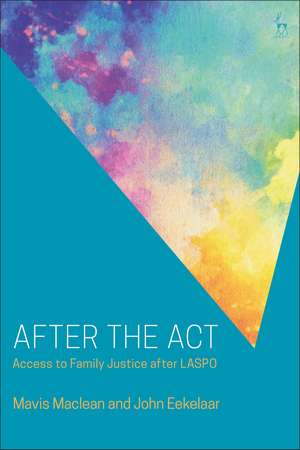After the Act: Access to Family Justice after LASPO
Autor Mavis Maclean, Professor John Eekelaaren Limba Engleză Hardback – 17 apr 2019
| Toate formatele și edițiile | Preț | Express |
|---|---|---|
| Paperback (1) | 190.59 lei 6-8 săpt. | |
| Bloomsbury Publishing – 18 noi 2020 | 190.59 lei 6-8 săpt. | |
| Hardback (1) | 436.99 lei 3-5 săpt. | |
| Bloomsbury Publishing – 17 apr 2019 | 436.99 lei 3-5 săpt. |
Preț: 436.99 lei
Preț vechi: 603.76 lei
-28% Nou
Puncte Express: 655
Preț estimativ în valută:
83.62€ • 89.42$ • 69.72£
83.62€ • 89.42$ • 69.72£
Carte disponibilă
Livrare economică 27 martie-10 aprilie
Preluare comenzi: 021 569.72.76
Specificații
ISBN-13: 9781509920198
ISBN-10: 1509920196
Pagini: 208
Dimensiuni: 156 x 234 x 20 mm
Greutate: 0.48 kg
Editura: Bloomsbury Publishing
Colecția Hart Publishing
Locul publicării:London, United Kingdom
ISBN-10: 1509920196
Pagini: 208
Dimensiuni: 156 x 234 x 20 mm
Greutate: 0.48 kg
Editura: Bloomsbury Publishing
Colecția Hart Publishing
Locul publicării:London, United Kingdom
Caracteristici
This timely and ground-breaking book fills a need for a comprehensive account of access to justice in family matters post-LASPO
Notă biografică
Mavis Maclean CBE was a co-founder of the Oxford Centre for Family Law and Policy, and is currently Senior Associate at the Department of Social Policy and Intervention, and Senior Research Fellow, St Hilda's College, University of Oxford.John Eekelaar is Emeritus Fellow of Pembroke College, University of Oxford.
Cuprins
1. Family Legal Problems and the Collapse of the Supportive State I. Introduction II. The Scope of the Problem III. The Post-War Changes to Legal Aid IV. Family Law: a Victim of its Own Success? V. Legal Aid in Family Matters After 2013 VI. The Renewed Push for Mediation VII. Paucity of Legal Provision VIII. Child Support IX. Are These Purely Private Matters? X. Conclusions, Methodology and What Follows 2. Government Activity After LASPO I. Community Legal ServicesII. Assisting Litigants III. Government Information Provision IV. Conclusions 3. The Response of the Legal Professions to LASPO: I Solicitors' Innovative and Pro Bono Activity I. Innovative Practices II. Pro Bono Activity III. Regulation and Liability 4. Legal Advice Clinics: Observational Data I. Clinic A: A Court-based Family Legal Advice Clinic (Staffed by Solicitors Assisted by PSU) II. Clinic B: A University-based Clinic Comprising a Legal Advice Centre with Local Practitioners and Students and a Separate Student Family Help Desk at Court, Run by a 'Pracademic' (A Faculty Member with a Practising Certificate as a Family Solicitor) III. Clinic C: A Family Legal Advice Clinic Linked with an Advice Agency IV. Concluding Observations 5. The Response of the Legal Professions to LASPO: II Barristers in Action Pro Bono I. Structural Issues II. Liability and Insurance III. Interview Data IV. Conclusions 6. Judicial Initiatives I. Introduction II. Specific Problems and Initiatives III. Observational Data IV. Conclusions 47. Support in Court by Non-Lawyers I. The Personal Support Unit (PSU) II. McKenzie Friends 8. The Student Contribution: Clinical Legal Education I. Aims II. Organisation of CLE III. Regulating CLE IV. CLE Training and Student Preparation for Family Work: Observational Data V. Conclusions on Student Pro Bono Activity 9. The Third Sector I. Introduction II. Observational Data III. 'Advice' in the Third Sector 10. Public Legal Education - Legal Capability and the Boundaries of Law I. The Legal Education Foundation II. Law for Life III. AdviceNowIV. Reflections on PLE 11. A Post-Legal World for Family Disputes? I. The Initiatives Summarised II. Impact Evaluation III. Which Way Forward? IV. The Place of Law in Family Matters
